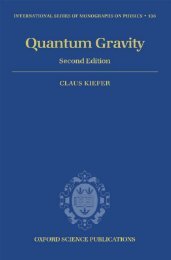Three Roads To Quantum Gravity
Three Roads To Quantum Gravity
Three Roads To Quantum Gravity
Create successful ePaper yourself
Turn your PDF publications into a flip-book with our unique Google optimized e-Paper software.
POSTSCRIPT 219<br />
This is good news indeed, for as soon as the light of experiment<br />
is turned on, sociological forces such as govern<br />
academic politics and fashion must slink back to the shadows,<br />
as the judgement of nature supercedes the judgements<br />
of professors.<br />
This is not the only place where cosmological observation<br />
and fundamental theory are confronting each other. An even<br />
more exciting—and for some disturbing—case has to do with<br />
the cosmological constant. This refers to the possibility—<br />
first realized by Einstein—that empty space might have a<br />
non-zero energy density. This energy density would be observable<br />
in the effect it has on the expansion of the universe.<br />
Once this possibility was accepted, it led to a major crisis<br />
in theoretical physics. The reason is that the most natural<br />
possibility allowed for the value of this empty space energy<br />
density is that it should be huge—more than a hundred powers<br />
of ten larger than is compatible with observation. The<br />
exact value—which is what the name cosmological constant<br />
refers to—cannot be predicted by current theory. In fact, we<br />
can adjust a parameter to get any value for the cosmological<br />
constant we want. The problem is that to avoid a huge cosmological<br />
constant, the parameter has to be adjusted to an<br />
accuracy of at least 120 decimal places. How such a precise<br />
adjustment is to be obtained is a mystery.<br />
This is perhaps the most serious problem facing fundamental<br />
physics, and it recently got worse. Until a few years<br />
ago, it was almost universally believed that even if it required<br />
a very precise adjustment, in the end the cosmological<br />
constant would be exactly zero. We had no idea why the<br />
cosmological constant would be zero, but at least zero is a<br />
simple answer. However, recent observations have suggested<br />
that the cosmological constant is not zero; it has instead a<br />
very small, but positive, value. This value is tiny on the<br />
scales of fundamental physics; in Planck units it is around<br />
10 –120 (or .0000. . . .) with 120 zeros before one encounters a<br />
non-zero digit.<br />
But even though tiny when measured in fundamental<br />
units, this value is large enough to have a profound effect on


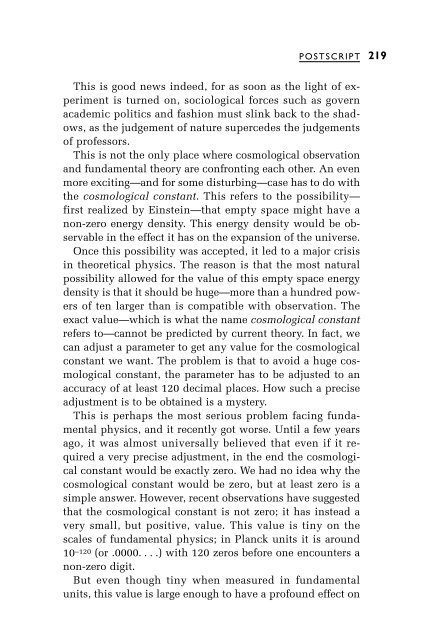
![arXiv:1001.0993v1 [hep-ph] 6 Jan 2010](https://img.yumpu.com/51282177/1/190x245/arxiv10010993v1-hep-ph-6-jan-2010.jpg?quality=85)
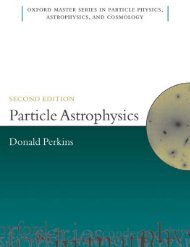
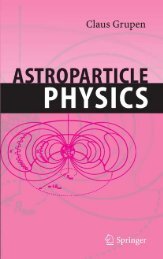
![arXiv:1008.3907v2 [astro-ph.CO] 1 Nov 2011](https://img.yumpu.com/48909562/1/190x245/arxiv10083907v2-astro-phco-1-nov-2011.jpg?quality=85)
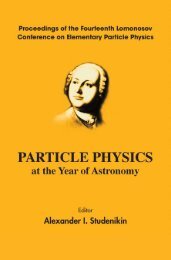
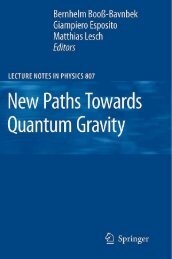
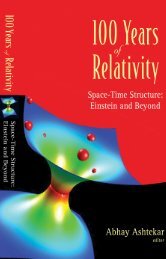
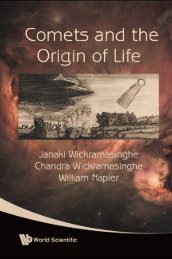
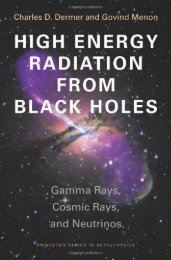
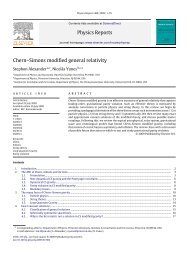
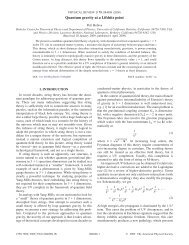
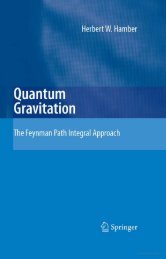
![arXiv:1002.4928v1 [gr-qc] 26 Feb 2010](https://img.yumpu.com/41209516/1/190x245/arxiv10024928v1-gr-qc-26-feb-2010.jpg?quality=85)
![arXiv:1206.2653v1 [astro-ph.CO] 12 Jun 2012](https://img.yumpu.com/39510078/1/190x245/arxiv12062653v1-astro-phco-12-jun-2012.jpg?quality=85)
